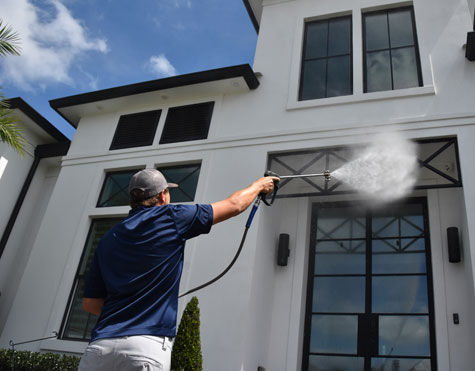
Soft washing is a specialized cleaning technique that uses low-pressure water and biodegradable cleaning solutions to remove dirt, mold, algae, mildew, and other contaminants from delicate surfaces. Unlike pressure washing, which relies on high-pressure water to blast away grime, soft washing provides a gentler yet highly effective approach, ensuring surfaces are cleaned without damage.
This method is ideal for roof cleaning, house exteriors, fences, decks, and other sensitive surfaces. The combination of eco-friendly detergents and low water pressure ensures a thorough clean while preventing wear and tear on materials.
Benefits of Soft Washing
1. Protects Surfaces from Damage
High-pressure washing can strip paint, crack siding, and damage roofing materials. Soft washing prevents these issues by using gentle water pressure and specialized cleaning solutions, making it safe for wood, stucco, vinyl siding, asphalt shingles, and more.
2. Removes Mold, Mildew, and Algae
Soft washing effectively eliminates organic growth such as mold, mildew, algae, and lichen that can weaken surfaces over time. These contaminants not only affect the aesthetics of your property but can also cause structural damage and health hazards.
3. Long-Lasting Results
Unlike pressure washing, which only removes surface dirt, soft washing kills bacteria and spores at the root. This prevents regrowth, ensuring surfaces stay clean for a longer period, reducing the need for frequent maintenance.
4. Eco-Friendly Cleaning Method
Soft washing uses biodegradable, non-toxic cleaning solutions that are safe for plants, pets, and the environment. The reduced water pressure also means less water consumption, making it an environmentally responsible choice.
5. Enhances Curb Appeal and Property Value
A clean and well-maintained exterior enhances your home’s curb appeal, creating a welcoming appearance while increasing property value. Regular soft washing prevents the buildup of dirt and stains that can make a property look old and neglected.
Best Areas for Soft Washing
1. Roof Cleaning
Roofs accumulate dirt, moss, algae, and black streaks over time. Soft washing is the safest method to clean asphalt shingles, tile, and metal roofing without causing damage.
2. House Exterior Cleaning
Soft washing is ideal for cleaning vinyl siding, stucco, brick, and painted surfaces. It removes dirt and discoloration while preserving the integrity of the materials.
3. Decks and Patios
Wood and composite decks can be easily damaged by high-pressure washing. Soft washing provides a deep clean, removing grime, mold, and algae without stripping sealants or finishes.
4. Fences
Whether wood, vinyl, or composite, fences collect dirt and mildew over time. Soft washing restores their original look without splintering or cracking the material.
5. Outdoor Furniture
Patio furniture, pergolas, and decorative outdoor structures can benefit from gentle cleaning, preserving their color and material integrity.
Soft Washing vs. Pressure Washing
1. Cleaning Method
Soft washing relies on low-pressure water and cleaning solutions to dissolve contaminants, while pressure washing uses high-pressure water to blast away dirt.
2. Surface Safety
Soft washing is suitable for delicate surfaces, whereas pressure washing is best for hard surfaces like concrete and brick.
3. Longevity of Cleanliness
Since soft washing kills bacteria and spores, surfaces stay clean longer compared to pressure washing, which only removes surface grime.
4. Environmental Impact
Soft washing is eco-friendly, using less water and biodegradable detergents, while pressure washing requires more water and may not fully eliminate organic growth.
Soft Washing Process – Step-by-Step Guide
1. Inspection and Preparation
The surface is inspected for mold, stains, and structural concerns. Any fragile elements are covered or protected before cleaning begins.
2. Application of Cleaning Solution
A specialized biodegradable detergent is applied to the surface. This solution breaks down dirt, mold, and algae at the molecular level.
3. Dwell Time
The cleaning solution is left to sit for a few minutes, allowing it to penetrate deep into the surface and kill bacteria, mold, and algae.
4. Gentle Rinsing
The surface is rinsed with low-pressure water, washing away dirt and contaminants without damaging the material.
5. Final Inspection
A final check ensures that all areas are thoroughly cleaned and any stubborn stains are treated again if necessary.
How Often Should Soft Washing Be Done?
The frequency of soft washing depends on location, climate, and exposure to dirt and organic growth:
- Roof Cleaning: Every 2-3 years
- House Siding: Every 1-2 years
- Decks and Fences: Every 1-2 years
- Patios and Walkways: Every 2 years
Regular soft washing prevents long-term damage and reduces the need for costly repairs.
DIY Soft Washing vs. Professional Soft Washing
DIY Soft Washing
- Requires specialized cleaning solutions and equipment
- Risk of uneven cleaning and potential surface damage
- Can be time-consuming and physically demanding
Professional Soft Washing
- Uses high-quality, eco-friendly solutions for long-lasting results
- Ensures even cleaning and full mold/algae removal
- Saves time and prevents potential damage to property
Hiring a professional ensures superior results, safety, and long-term surface protection.
Why Choose Supreme Cleans Au for Soft Washing?
Supreme Cleans Au provides expert soft washing services designed to protect and enhance the appearance of residential and commercial properties. With advanced techniques, eco-friendly products, and experienced professionals, surfaces are cleaned safely and effectively.
Contact Supreme Cleans Au today to schedule a reliable, affordable, and high-quality soft washing service that restores and protects your property!